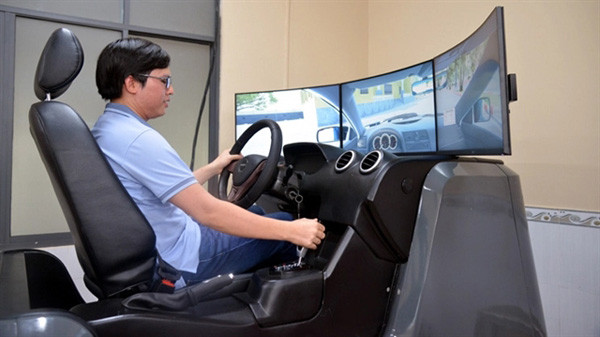
Starting January 1, 2023, driving training centres must have digital driving simulators installed. However, multiple facilities are struggling to meet the deadline due to challenges in device procurement.
Phan Thanh Uy, deputy general secretary of Vietnam Automobile Transport Association, said that it was not until November 15 this year that the managing agency decided on the quality controller for the simulator cabins.
The first simulator model was recognised as qualified at the beginning of December. Time constraints have made it difficult for driving training centres to respond to the requirements.
On the website of the Directorate for Roads of Vietnam, there are currently two qualified providers of driving simulators, which are Viettel High Technology Industries Corporation (a branch of Viettel Military Industry and Telecoms Group) and Ecotek Technologies Corporation.
Lai Van Chat from Thanh Dat Driving Training Centre in Hanoi said that with a facility of 1,000 students every three months, or 111 students per class each month, the simulator would need to operate at least 12 hours per day.
Also according to these calculations, this facility would need to invest in 28 simulators, equivalent to enormous expenses.
Chat said: “Currently, there are only two qualified providers, while each simulator cabin costs hundreds of dong, and that’s not including the operational costs.
“This is putting tremendous pressure on training facilities.”
Nguyen Duc Hai, director of Duc Thinh Automobile Driving Licensing and Testing Centre in the capital city said that centres might have to spend VND400-500 million (US$17,000-21,000) on a driving simulator yet receive no fee from students during practice.
Hai said: “Driving simulator cabins are part of the training programme. Therefore, there is no additional fee but the investment is too much.
“With these simulators, tuition fees will definitely increase. However, calculations are needed so that students are not significantly affected.”
Hai added that with over 300 driving training facilities across the country, it is not easy for any supplier to respond to the demands for simulator cabins. Therefore, the possibility of centres having to suspend operations is in sight.
Pham Duy Bay, principal of LILAMA Vocational College in Ninh Binh Province said that the procurement process for driving simulator cabins includes drafting an estimated budget and submitting it for approval, then followed are procedures for direction, price appraisal, plan approval, contractor selection, and bidding.
Bay said: “These procurement stages according to regulations could take up to two or three months.
“With the current situation, there won’t be enough time to procure digital simulators for driving training before January 1, 2023.”
Nguyen Van Quyen, chairman of Vietnam Automobile Transportation Association said that when there are too few driving simulator suppliers, high tension in buying and selling, price surges and little time for quality checks, in addition to problems arising during operations and maintenance.
The association suggested choosing five facilities as a pilot programme of using driving simulators, with two or three cabins in each centre for a duration of three to six months.
After a thorough evaluation, State management agencies can continue issuing guidelines, making necessary adjustments and upscaling investments.
Nguyen Van Toan, Dong Do Driving Test Centre’s members’ council chairman said: “Simulator cabins are only for reference use, learning how to drive still requires knowledge, practice drives and real-life experiences.
“The Ministry of Transport should adjust regulations and decrees for applicability in real situation and high efficiency for students.”
Source: Vietnam News